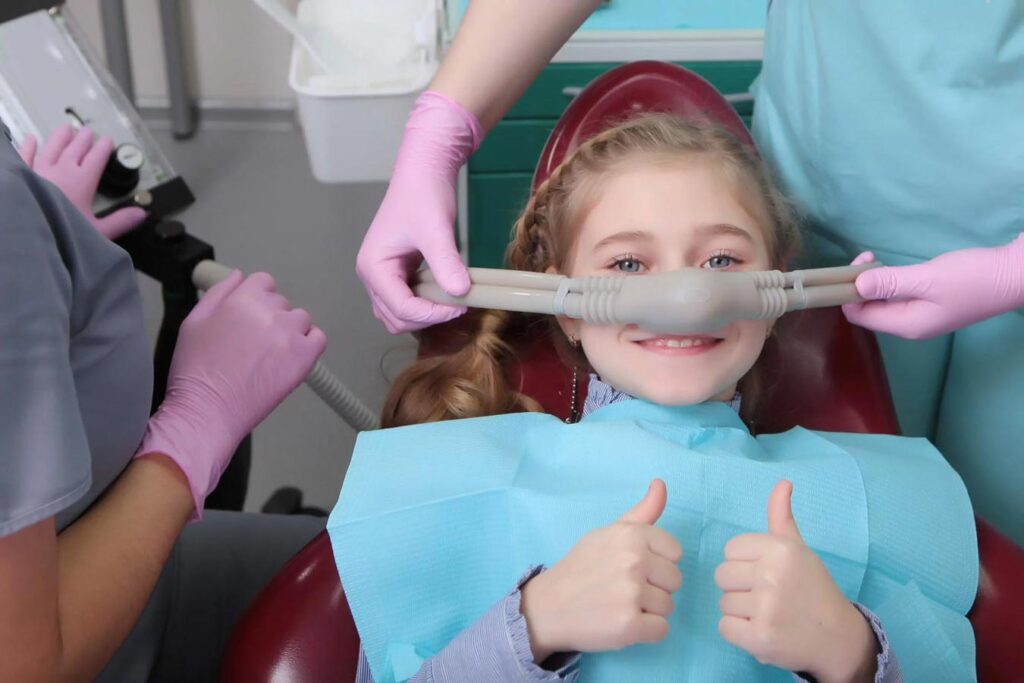
Do you feel anxiety and stress about visiting the dentist? It’s normal for people to be uncomfortable during dental appointments, especially when treatments or major dental work is being done. If you have difficulty sitting still during these treatments, you might consider the benefits of dental sedation.
Not only is dental sedation helpful for patients with anxiety, but it can also be a good option for young children or anyone who wants to improve their comfort during the appointment. Dental sedation is a way to help you relax and stay calm in the dental chair, with different types of medication and various levels of sedation.
The Different Types of Dental Sedation
There are three common types of dental sedation used in the industry, depending on the dentist you visit and the type of treatment being performed.
1. Laughing Gas (Nitrous Oxide)
This is the lightest form of dental sedation and can be used on both adults and children. With laughing gas, you stay away during the treatment. You’ll wear a mask that releases gas into your body when you breathe. The laughing gas helps you relax.
It only takes a few minutes for laughing gas to set in. Then the dentist will begin the appointment when you are relaxed. Also, laughing gas tends to wear off quickly, which means that you can go back to work after the treatment.
Since laughing gas is a light form of sedation, it carries a much lower risk compared to other types of dental sedation. If you experience any side effects (which is rare), these side effects usually go away when the mask is removed. Laughing gas can be used for everything from routine teeth cleanings to fillings or root canal treatments.
2. Oral Sedation
Another type of dental sedation is known as oral sedation. The dentist will give you a prescription for a prescription pill that needs to be swallowed before your appointment. You will need someone who can drive you to and from the dental treatment since you will be drowsy from this medication.
Usually, the medication is strong enough to make you fall asleep. But you are sleeping light enough that we can wake you up if needed. You’ll need to plan to take the rest of the day off from work or school to give the medication time to wear off.
3. IV Sedation
The final type of sedation involves an IV placement in your arm, with medication that flows into your bloodstream. This type of dental sedation causes you to sleep through the entire treatment. The medical team has the ability to change the level of sedation during the appointment. This type of sedation is common for routine procedures, such as wisdom tooth extraction.
You will definitely feel drowsy as you wake up. As with oral sedation, you’ll need someone to drive you home from the appointment, and you should plan on taking the rest of the day off for recovery.
6 Benefits of Dental Sedation
Is dental sedation right for you? Here are some of the benefits you can enjoy from this service:
- Stop Delaying Dental Treatments: If you have a phobia about visiting the dentist, then it might cause you to live with an unbearable toothache or other dental issues. The problem with delaying treatment is that the problems can get worse and even cause complications requiring more invasive treatments. Instead of suffering from dental pain, sedation is a strategy that you can use to manage this phobia and complete the treatments as soon as possible.
- Calm Your Anxiety: Sometimes, patients have a hard time sitting still in the dental chair because their anxiety levels are so high. If you feel nervous, then dental sedation is a way that you can calm your nerves enough to get through the treatment.
- Better Dental Care: In some cases, dental sedation allows the dentist to complete the treatment more quickly and effectively. The sedation relaxes the patient, which helps minimize movement while the dentist works. As a result, the work can be done with precision and without worrying about interference from the patient.
- Unique Situations: There are different circumstances when dental sedation is highly recommended because of the patient’s condition. For example, young children needing a lot of dental work, patients with special needs, or patients with mental health conditions.
- Minimize Gag Reflexes: One of the things that can get in the way during dental treatment is the way a person gags because of sensitive reflexes. Consider asking about sedation if you tend to gag with the dental tools in your mouth. The sedation’s relaxing effect helps reduce your nerves, decreasing the gag reflex sensitivity.
- Multiple Treatments: When multiple dental treatments are required, it can be helpful to use dental sedation, so you stay in the dental chair longer. As a result, you can complete everything at once instead of coming back to the dental office for different appointments.
Is Dental Sedation Right for You?
Every patient is unique, which is why there isn’t a cookie-cutter treatment plan for each person. The best thing you can do is talk to your dentist about different treatment options to identify the ideal solutions for your unique needs.
If you are considering dental sedation, the dentist will ask questions about your medical history and any other conditions that could increase the risk of complications. As the patient, it’s important that you understand all the risks and provide the most accurate information to help the dentist select the right treatment for you.
Dental sedation is one of the many ways you can feel more comfortable in a dental chair. If you have questions about sedation or other treatments, feel free to talk to our team for more information.
We invite you to contact us at Cosmetic & Family Dentistry of Las Colinas if you would like to schedule a routine exam or discuss available treatments.
- Awareness16
- Bad Breath1
- Bone Grafting1
- Braces4
- Causes, Symptoms, And Treatments6
- Cavities5
- Chewing Gum1
- Cosmetic Dentistry of Las Colinas15
- COVID-192
- Deep Cleaning7
- Dental Anxiety1
- Dental Bridge2
- Dental Care27
- Dental Cleaning6
- Dental Crown1
- Dental Filling1
- Dental Health24
- Dental Implants6
- Dental Sedation1
- Dental Visit1
- Dental X Ray3
- Floss1
- Gum Dieseases4
- Injury1
- Insurance1
- Invisalign8
- Oral Cancer1
- Oral Hygiene24
- Root Canal9
- Sleep Apnea2
- Tartar1
- Teeth19
- Thanksgiving1
- TMJ1
- Tongue1
- Veneers2
- White Teeth12
Get Your Best Smile With Us
